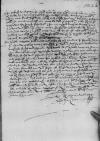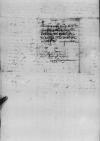Zuvor an Ewer G(naden) ⌊⌋ d(atum) 11 Ianuarii hab ich for lengst empf(angen), / darzu vernome(n), wie yr mein ⌊⌋ diss dat(um) 13 het(en) auch empf(angen) het(en). Dess hiber geschri(be)n halb(en), ist on not euch uff ain new(e)s darvo(n) zu schreib(en), / Ewer G(naden) wiss(en), wie si uns hie p(ro)rest(?) schuldig ist newnunddrysig ducat(en) zway hundert und sib(en) m(araved)is laut ainer rechnung so ich Ewern G(naden) hier mit sind daryn ir suche(n) migt wie all ding ist aus geb(en) / soli(ch) 39 duc(aten) 207 m(araved)is gelieb euch unss(er)n here(n) dauss(en) zu bezall(en), / dene(n) hab ich auch der gleiche(n) rechnung gethan.
Der ⌊Ysabel Delgado⌋ halb(en) wais auch E(wer) G(naden) indes sonders zu schreib(en), jezt zu Ostern vergang(en) was ich bey yr zu ⌊Vall(adol)id⌋ hoch si und die ⌊kinder⌋ wass alle frisch und gesundt. / Wie woll die s(eñor)a ⌊Ysabel⌋, was ain zeit hier kranck gewest und besser word(en). / Ich vernim(m) nit anderst, da(n) d(a)z ⌊si⌋ frisch und gesundt seye(n) und d(a)z si sich recht holt. Mich gedonct aber furwar her si kind mit de(n) gelt d(a)z jar nit woll auskome(n), mit 2 kind(en) / bey der gross tewerung, so im gantze(n) land ist / und sonderlich vernum ich, si sich ser verzeit hat, in yrer kranckhat und schier all ding versezt und tods verkaufft und als mich die sach ansicht, wie grosslich vo(n) E(wer) G(naden) thete ain p(ro)visio(n) und gebe ir ain merers sodan was zu ainen steu(e)r. / Ich will yr mit de(n) 20 tause(n)t m(araved)is yerlich uff jed(e) zeit mir geben loss(en), / befelcht yr mir, da(n) yr wurts zu geb(en) kom ich do auch noch. /
Kan ich E(wer) G(naden) yn andr(en) auch dien(en), soll mich E(wer) G(naden) alzeit willig find(en). / Darmit schoff und gepiett Got mit uns alle(n). /


 BCz, 1595, p. 110
BCz, 1595, p. 110